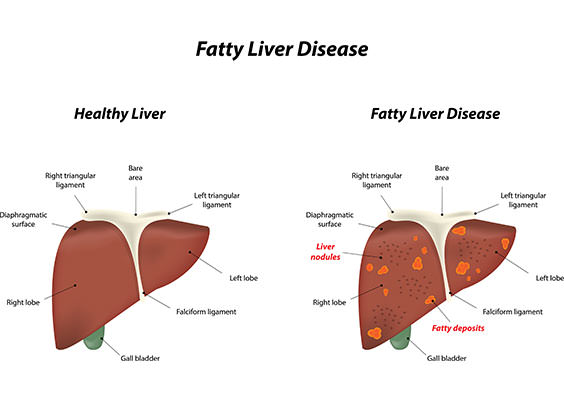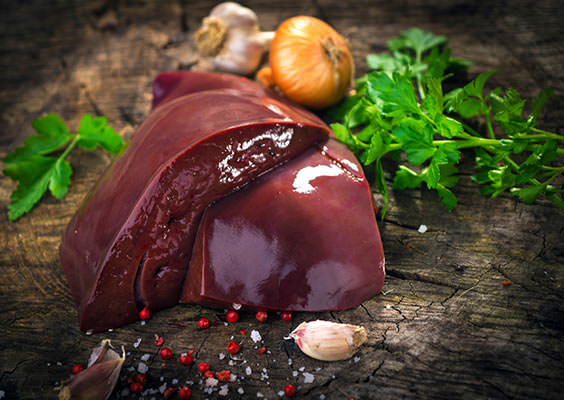I’m seeing a disturbing trend in my practice. More and more people are coming in with a deadly liver condition. In medical school I was taught that liver disease was limited to hardcore drinkers. But the people I’m seeing aren’t heavy drinkers. Some don’t drink at all.
It’s one of the fastest-growing health epidemics in the world. And here’s the tragedy. Mainstream medicine has no effective drug or other treatment for this condition.
What is NAFLD?
I’m talking about non-alcoholic fatty liver disease (NAFLD). NAFLD causes serious liver problems. It results in painful swelling and scarring that can lead to cirrhosis, liver failure and even death.

NAFLD caused by the foods we eat
I blame our modern food supply for this new epidemic. Industrial foods are drenched in Big Agra’s high-fructose corn syrup. It’s in everything from Oreos to salad dressings to sodas.
That is a disaster. Let me explain…
Fructose isn’t like other sugars. Most of it goes straight to your liver instead of going into your muscles and tissues for energy. It promotes the formation of new triglyceride fat molecules. It triggers your liver cells to store this fat where it doesn’t belong. At the same time, it blocks the breakdown of old fats. It stimulates free radical production and promotes insulin resistance. All of that results in inflammation and NAFLD.
What are the signs of NAFLD?
You could have NAFLD and not even know it. Up to 30% of Americans do. You see, NAFLD is a sneaky disease. In the early stages, the only signs are some fatigue and maybe a dull pain in the right upper quadrant of your abdomen.

How to help treat NAFLD
But there is good news. Recently a study in the Journal of the American College of Nutrition reported that coenzyme Q10
(CoQ10) can help treat NAFLD.Effects of CoQ10
The randomized, double-blind trial included 41 people with mild to moderate NAFLD. Researchers gave half the patients 100 milligrams of CoQ10 every day. The other half got a placebo. After 12 weeks, all of the signs of NAFLD were lower in the CoQ10 group.
In addition, the researchers graded the NAFLD cases by the percentage of liver cells containing fat droplets before and after treatment. No patients had a normal grade at the start of the trial but four patients returned to normal liver function after the CoQ10 treatment. Only one patient on the placebo group returned to normal.
Benefits of CoQ10
CoQ10 also boosted levels of adiponectin, a protein linked to weight loss, better insulin sensitivity and lower levels of inflammation.
I’m not surprised by these results. I’ve been recommending CoQ10 to my patients for decades for heart health. It’s a powerful antioxidant and anti-inflammatory.
How to get CoQ10
You can get CoQ10 from food, especially beef, sardines, mackerel, peanuts, and organ meats like liver and kidney. But the amounts in food won’t be enough to protect your heart and to stop NAFLD.

And if you’ve been taking Big Pharma’s statin drugs, your levels of CoQ10 are likely to be very low. You see, statins deplete your body’s supply of CoQ10 by about 20%.
That’s why I recommend taking a supplement.
Most CoQ10 supplements you find in the drugstore contain ubiquinone. Your body has to reduce ubiquinone to ubiquinol in order to use it. But as you get older, your body’s ability to make that conversion drops off.
If you’re over 40, you need the ubiquinol form of CoQ10. It may cost you a little more but it’s worth the price. That’s because ubiquinol is FAR more effective. One study found that taking 450 mg of ubiquinol was almost three times as effective as the same dose of CoQ10.
I recommend taking 100 to 300 milligrams of ubiquinol per day (divided into two doses). Don’t go overboard. Very large doses (1,000 mg or more per day) may cause restlessness and insomnia.
To Your Good Health,
Al Sears, MD, CNS
References
1 Farnaz Farsi et al. “Functions of Coenzyme Q10 Supplementation on Liver Enzymes, Markers of Systemic Inflammation, and Adipokines in Patients Affected by Nonalcoholic Fatty Liver Disease: A Double-Blind, Placebo-Controlled, Randomized Clinical Trial.” Journal of the American College of Nutrition 2016; Volume 35, Issue 4, 2016, pages 346-353.
2 Fallon, S. and Enig, M., “Dangers of Statin Drugs: What You Haven’t Been Told About Popular Cholesterol-Lowering Medicines,” The Weston A. Price Foundation. Jun 14, 2004.
3 Langsjoen P. 5th Annual International CoQ10 Symposium. Kobe, Japan: November 9-12, 2007.

